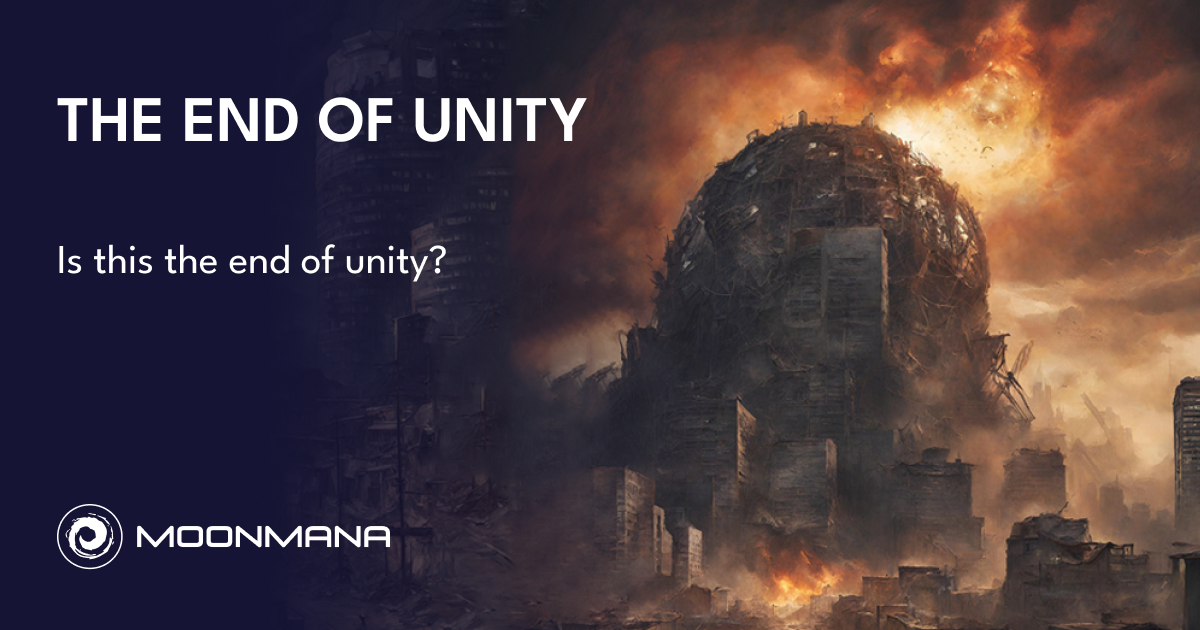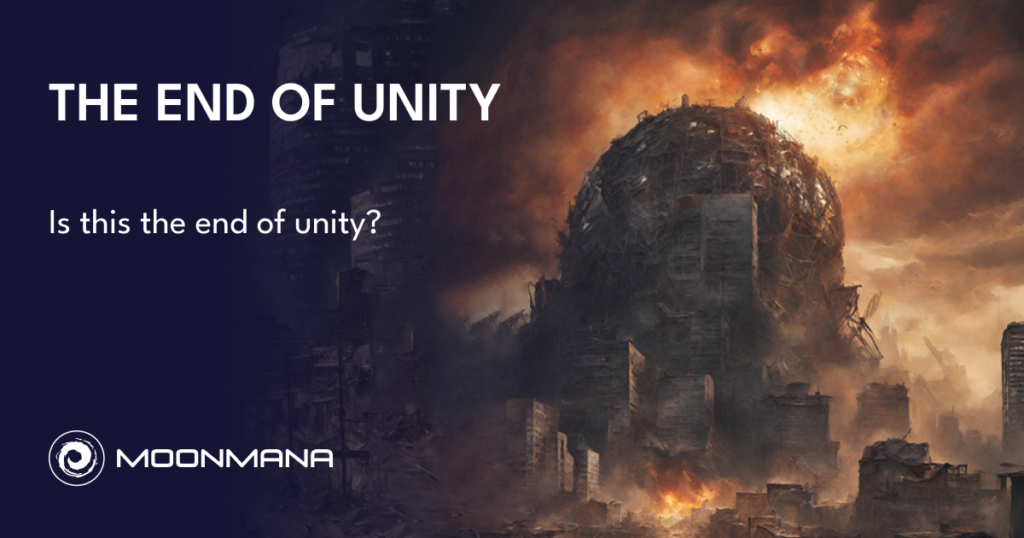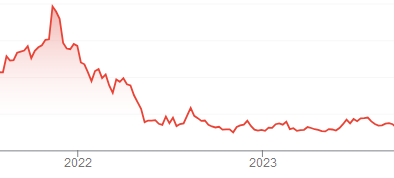
The end of unity
Unity: Depression, suicide and resuscitation

Install fee is not a coincidence
Many perceived the recent news of the introduction of the Unity Install Fee as an insult to developers, a loss of trust, a stab in the back, and a slap in the face to the entire community. However, if we look at the events of the past two years that have occurred within Unity, we can see that this is not a random occurrence, a management mistake, or a sudden thirst for more profit. It appears more like suicide after a prolonged period of depression.
Why do I think this way? Let’s start by examining the Unity stock chart.

Unity’s stocks have been falling for a while now. Unity has long been a company operating at a loss, allocating more resources to marketing and promoting its engine than to the engine itself. The engine itself consistently introduced new features that were either poorly executed, such as Multiplayer, which died in its infancy, or underwent multiple reiterations, like Rendering, user interface, or input systems.
Many features entered beta but were later abandoned and disappeared. Competing with its main rival, Unreal Engine, proved challenging. Unity couldn’t bring itself up to the level of graphics seen in Unreal Engine, nor match the quantity and quality of features available for free within Unreal engine out of the box.
The latest systems that were announced and brought to some degree of release state didn’t prove to be particularly useful to anyone. Systems like DOTS, ECS made programmers to downgrade the readability of their code in cost of better performance: a trade not everyone agreed to accept. The new features didn’t rescue the situation with the company stagnation.
A powerful blow - App Tracking Transparency
Because Unity was primarily chosen by small studios, and even more frequently by indie developers who used the free Unity license, the revenue from selling Unity licenses was very low.
A significant portion of Unity’s revenue came from advertising, and this revenue stream was hit hard by Apple’s new system – ATT (App Tracking Transparency).
Unity has seen its stocks fall by around 75% in 2022 until July. Their decision to merge with ironSource was driven somewhat by the economic downturn but also by Apple’s App Tracking Transparency (ATT) framework, which rolled out last year. Unity relied on developers buying advertising to acquire new users, and ATT hit this source of Unity’s income hard.
This blow marked the beginning of Unity’s depression: mass layoffs, a decline in stock prices, the inability to compete with Unreal Engine, hopelessness, helplessness – all of these lead to depression, and depression often leads to suicide.
The rats fleeing a sinking ship
COVID-19 initiated a financial crisis that continues to this day and has only intensified with Russia’s military aggression. The financial situation has significantly worsened not only in Unity but also in many global companies. As reported by Yahoo Finance, Unity’s management began selling their shares even before the announcement of the install fee. This suggests that they had already lost faith in their company, and the introduction of the install fee is the final step at the end of this depression, namely suicide.
Stage 5: Acceptance
Judging by Unity’s response to the boycott of Unity Ads and the angry letters from developers, it appears that Unity has no intention of canceling the install fee. Rumors about them adjusting these changes or introducing a 4% limit don’t seem to significantly alter the situation. It seems that the install fee is their final decision and represents a form of corporate suicide. This is something that needs to be acknowledged, and businesses must consider their next steps.
Even after the announcement of these changes, the install fee remains, trust has been shattered, and many companies are contemplating switching to other game engines. Yes, some studios may choose to stay with Unity under the 4% limit and accept these conditions. However, for many companies, even these terms are unacceptable and unprofitable.
What will happen to companies that developed small games, such as hyper-casual or idle games, which earned only a few cents per installation? With the install fee, Unity has made such games almost 100% unprofitable, and these companies will likely have to transition to a different game engine.
The aftermath
Other game engines will develop more rapidly if a large number of Unity developers start transitioning to other open-source engines, and these developers will begin contributing to the development of open-source engines.
Recently, the developer of Terraria has donated $100,000 to open-source engines Godot and FNA in response to the Unity backlash.
Many developers already decided to port their Unity games to other engines.
Each developer can make a small contribution or bring their technologies into an open-source engine to make it better. Just like Unity started as a rather limited engine but grew into a powerful engine and became convenient for rapid development, partly thanks to third-party developers who created plugins for Unity.
These same developers, by porting their games, tools and plugins to other engines, will contribute to the growth of other engines, and the industry will change but not die. The demise of one player like Unity cannot kill the game industry; it can only reshape and rejuvenate it.
What about us?
At Moonmana, we have always been cautious about third-party technologies. We have developed game development tools that work with all engines and are not dependent on whether you are making a game in Unity, Unreal, or a proprietary engine. Our quest system, script system, localization system, and other systems function in any engine.
I have always strived to educate our professionals so that they are not confined to working exclusively with one engine. In our company, people are skilled in working with various engines, including Unreal Engine, Unity, Cocos2Dx, and various web engines. Additionally, we have our own engine, the Moonmana Engine, which we created for our games and used for projects like Pirates of Everseas, Legendary Dwarves, Ultimate Pirates, as well as several client projects.
We have developed an internal programming language translation tool called Vividglow, which we use to translate usable code and not be tied to the engine on which we are developing a game. For our company and internal projects, Unity’s suicide move means very little. Our main project, Haddie’s Pizzeria, is being developed on Unreal Engine, and all new projects we initiated in Unity can easily be transitioned to another engine using our tools.

What about others?
What should other companies that have already developed games in Unity do? If a game is generating a significant amount of revenue but becomes unprofitable with Unity’s new rules, they may need to consider either shutting it down or transitioning it to another game engine. If you need assistance in porting to another engine, feel free to reach out to us. We can help you to port a Unity game to other engine, because we have experience in porting games from various engines, to various engine, including porting from Unity and porting to Unity. We can not only help you to choose the most suitable engine for your game to port your unity game to this engine, but also, if needed, we can port the Unity game to the chosen engine.
Artem Shpytiak, CEO/Founder of Moonmana
